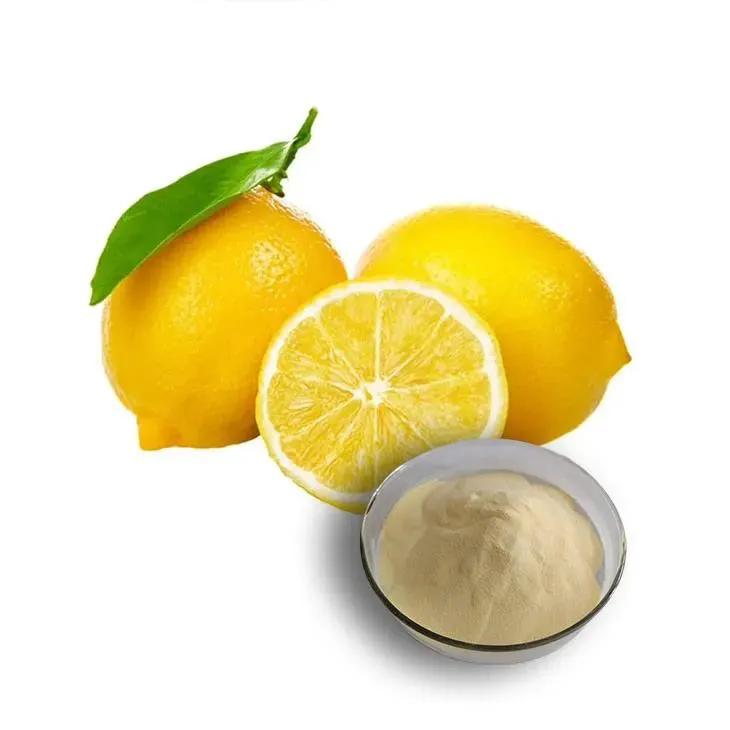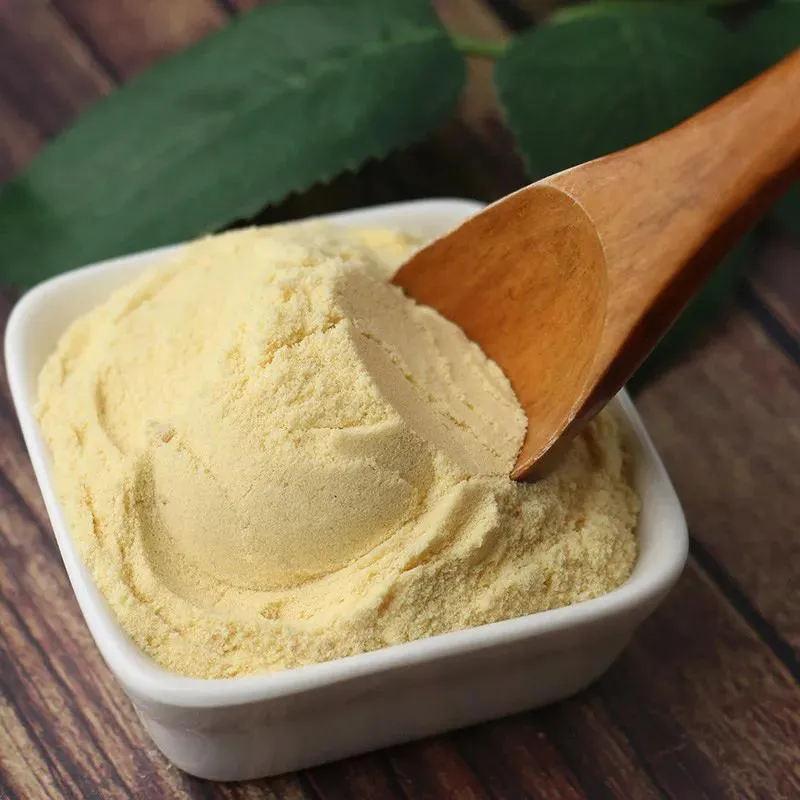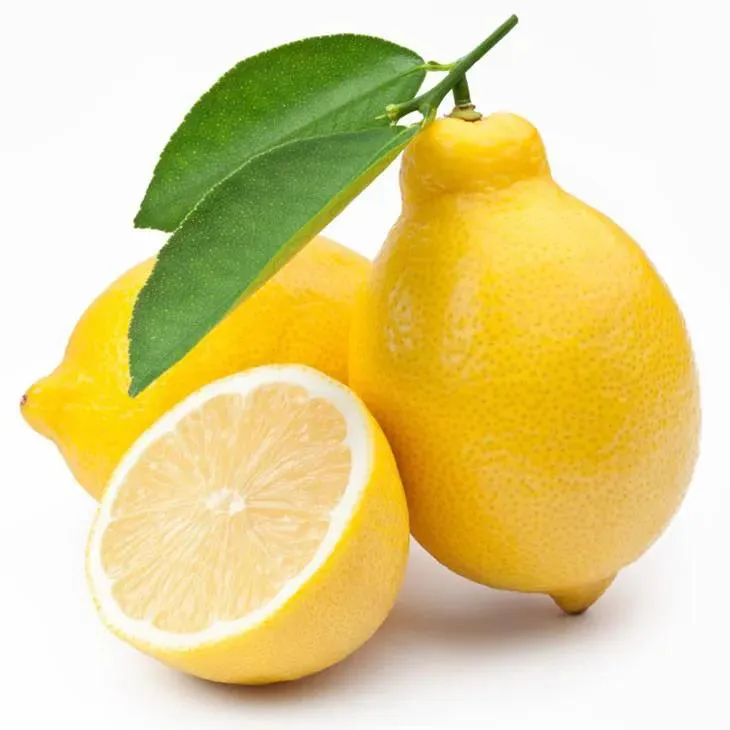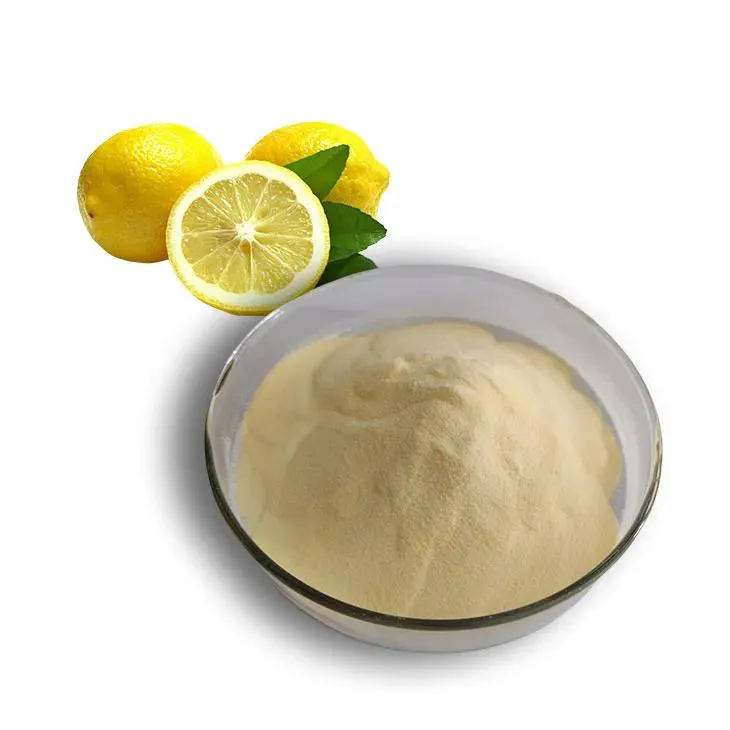- 0086-571-85302990
- sales@greenskybio.com
Lemon Juice Powder Bulk Manufacturers and Exporters.
2024-12-13

The Importance of Lemon Juice Powder in the Food Industry
Lemon Juice Powder has emerged as a significant component in the food industry. It offers a convenient and long - lasting alternative to fresh lemon juice. In today's fast - paced world, where the demand for ready - to - use ingredients is increasing, Lemon Juice Powder fits perfectly. It is widely used in various sectors of the food industry, from households to large - scale food processing plants.

The Role of Manufacturers
1. Source of Quality Lemons
Manufacturers of lemon juice powder play a crucial role in the production process. Their first and foremost task is to source the best - quality lemons. These lemons are the building blocks of a high - quality product. High - quality lemons ensure that the final powder has a rich flavor and excellent nutritional value. The origin of the lemons can also impact their quality. Lemons sourced from regions known for their ideal growing conditions, such as the Mediterranean, are often preferred due to their superior taste and aroma.
2. The Manufacturing Process
The manufacturing process of lemon juice powder is a combination of traditional and modern techniques.
- Harvesting: After the lemons are carefully harvested, they are sorted to remove any damaged or unripe fruits. This initial step is essential to ensure that only the best lemons enter the production process.
- Squeezing: Traditional squeezing methods are often employed initially to extract the juice. This step helps in obtaining the purest form of lemon juice. Manual squeezing or mechanical presses can be used, depending on the scale of production.
- Refining and Processing: Once the juice is obtained, it undergoes a series of refining processes. Modern drying techniques, such as spray drying or freeze - drying, are used to convert the liquid juice into a powder form. These methods help in preserving the flavor, aroma, and nutritional content of the lemon juice. During this process, any impurities are removed, and the powder is carefully monitored for quality.
3. Quality Control
Quality control is a continuous process in lemon juice powder manufacturing.
- Acidity Levels: Manufacturers need to closely monitor the acidity levels of the powder. The acidity not only affects the taste but also the shelf - life of the product. If the acidity is too high or too low, it can lead to an unbalanced flavor and potential spoilage.
- Color: The color of the lemon juice powder is an important quality indicator. A bright, yellow - orange color is typically associated with high - quality powder. Any deviation from the normal color could indicate a problem in the manufacturing process or the quality of the raw materials.
- Purity: Ensuring the overall purity of the powder is crucial. This involves removing any foreign particles, such as pulp residues or contaminants. High - purity powder is not only more appealing to consumers but also meets the strict quality standards of the food industry.

The Function of Exporters
1. Understanding International Markets
As exporters, they need to have a deep understanding of international markets. Different regions around the world have varying taste preferences when it comes to lemon juice powder.
- In some European countries, consumers may prefer a more intense and tart lemon flavor. This could be due to their long - standing culinary traditions that often feature bold and acidic flavors.
- In Asian markets, on the other hand, a milder lemon flavor might be more popular. Asian cuisine often balances flavors in a more delicate way, and a strong lemon taste could overpower other ingredients.
- In the Americas, the demand can vary depending on the specific application. For example, in the beverage industry, a more refreshing and moderately tart lemon flavor is often desired.
2. Packaging for Export
Packaging is a critical aspect of exporting lemon juice powder.
- Protection during Transit: The powder needs to be protected from moisture, heat, and physical damage during transportation. Appropriate packaging materials, such as moisture - proof bags or containers, are used to ensure the product arrives in perfect condition.
- Marketing Tool: Packaging also serves as a marketing tool. Eye - catching designs, clear product labels, and information about the product's origin, quality, and usage can attract consumers. For example, a package that showcases the natural and pure nature of the lemon juice powder can be more appealing to health - conscious consumers.

The Global Demand for Lemon Juice Powder
1. In Home Cooking
The demand for lemon juice powder in home cooking has been steadily increasing. It offers several advantages over fresh lemon juice.
- Convenience: It is much easier to store and has a longer shelf - life compared to fresh lemons. A small container of lemon juice powder can be kept in the pantry for months and can be used as needed.
- Consistency: The powder provides a consistent flavor in cooking and baking. There is no need to worry about the variability in the acidity or flavor of fresh lemons, which can be affected by factors such as the season and the variety of lemon.
2. In Large - Scale Food Production
In large - scale food production, lemon juice powder has become an indispensable ingredient.
- Beverages: In the ready - to - drink beverage industry, lemon - flavored drinks are extremely popular. Lemon juice powder can be easily added to these beverages during the manufacturing process, providing a consistent lemon flavor. It is also cost - effective compared to using fresh lemon juice.
- Processed Foods: Many processed foods, such as salad dressings, sauces, and desserts, use lemon juice powder. It helps in enhancing the flavor, adding a tangy note, and also acts as a natural preservative in some cases.

Challenges Faced by Manufacturers and Exporters
1. Competition
The market for lemon juice powder is highly competitive. There are numerous manufacturers and exporters vying for a share of the global market.
- Price Competition: To gain a competitive edge, some companies may lower their prices. However, this can be a double - edged sword as it may affect the quality of the product if cost - cutting measures are not implemented carefully.
- Quality Competition: Consumers are becoming more discerning and demand high - quality products. Manufacturers and exporters need to constantly strive to improve the quality of their lemon juice powder to stand out in the market.
2. Regulatory Requirements
Different countries have different regulatory requirements for food products.
- Ingredient Labeling: Exporters need to ensure that their product labels accurately list all the ingredients, including any additives or preservatives used in the manufacturing process. Failure to comply with labeling regulations can lead to product recalls or bans in certain markets.
- Quality and Safety Standards: Meeting the quality and safety standards of different countries can be a complex task. For example, some countries may have stricter limits on pesticide residues or microbiological contaminants in food products.
Future Trends in Lemon Juice Powder Manufacturing and Exporting
1. Innovation in Manufacturing
The future of lemon juice powder manufacturing is likely to see more innovation.
- Improved Processing Techniques: Manufacturers may invest in research and development to find more efficient and environmentally - friendly drying techniques. This could lead to a reduction in production costs and a further improvement in product quality.
- Value - Added Products: There may be a trend towards creating value - added lemon juice powder products. For example, adding other natural flavors or nutrients to the powder to target specific consumer segments, such as those interested in functional foods.
2. Expansion in Emerging Markets
As the global economy grows, there are opportunities for expansion in emerging markets.
- Increasing Consumption in Developing Countries: Developing countries are showing an increasing appetite for processed food products, including those containing lemon juice powder. This presents an opportunity for manufacturers and exporters to tap into these growing markets.
- Catering to New Tastes: Manufacturers may need to adapt their products to suit the unique taste preferences of emerging markets. For example, creating new flavors or product formulations that are more in line with the local cuisine.
FAQ:
What are the key factors in selecting lemons for lemon juice powder manufacturing?
The key factors in selecting lemons for lemon juice powder manufacturing are quality. High - quality lemons are the foundation for a great - tasting and high - quality lemon juice powder. This includes factors such as the freshness of the lemons, their size, and their ripeness. The acidity level of the lemons is also important as it affects the final taste of the powder.
How do manufacturers ensure the quality of lemon juice powder during the manufacturing process?
Manufacturers ensure the quality of lemon juice powder during the manufacturing process by being vigilant at every step. They start with monitoring the quality of the lemons used. After obtaining the juice through traditional squeezing methods, they refine and process it using modern drying and powder - making techniques. During this process, they monitor the acidity levels, the color, and the overall purity of the powder.
What role does packaging play for lemon juice powder exporters?
Packaging plays a significant role for lemon juice powder exporters. Appropriate packaging protects the product during transit, preventing damage and spoilage. It also serves as a marketing tool. The packaging can attract customers' attention and communicate important information about the product, such as its ingredients, usage instructions, and origin.
How do exporters of lemon juice powder adapt to different taste preferences in international markets?
Exporters of lemon juice powder adapt to different taste preferences in international markets by being aware of cultural differences. For example, some regions may prefer a more tart lemon flavor, while others may like it milder. They can adjust the manufacturing process slightly to meet these different preferences, such as by controlling the acidity levels during production.
Why is the demand for lemon juice powder increasing globally?
The demand for lemon juice powder is increasing globally because it is used not only in home cooking but also in large - scale food production. It is a versatile ingredient that can be used in ready - to - drink beverages, processed foods, and many other food products. Its convenience and long shelf - life also contribute to its increasing popularity.
Related literature
- The Manufacturing and Export of Fruit - Based Powders: A Comprehensive Guide"
- "Lemon Juice Powder: Production, Quality Control and Market Trends"
- "Bulk Food Exports: The Case of Lemon Juice Powder"
- ▶ Hesperidin
- ▶ Citrus Bioflavonoids
- ▶ Plant Extract
- ▶ lycopene
- ▶ Diosmin
- ▶ Grape seed extract
- ▶ Sea buckthorn Juice Powder
- ▶ Fruit Juice Powder
- ▶ Hops Extract
- ▶ Artichoke Extract
- ▶ Mushroom extract
- ▶ Astaxanthin
- ▶ Green Tea Extract
- ▶ Curcumin
- ▶ Horse Chestnut Extract
- ▶ Other Product
- ▶ Boswellia Serrata Extract
- ▶ Resveratrol
- ▶ Marigold Extract
- ▶ Grape Leaf Extract
- ▶ New Product
- ▶ Aminolevulinic acid
- ▶ Cranberry Extract
- ▶ Red Yeast Rice
- ▶ Red Wine Extract
-
Rosemary extract
2024-12-13
-
Hesperidin
2024-12-13
-
Bitter Melon Extract
2024-12-13
-
Bayberry Extract
2024-12-13
-
Scutellaria Extract
2024-12-13
-
Cocoa Extract
2024-12-13
-
Elderberry Extract
2024-12-13
-
Angelica sinensis extract
2024-12-13
-
Jujube Extract
2024-12-13
-
Tormentil Extract
2024-12-13





















